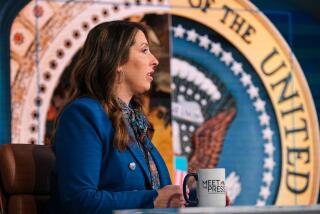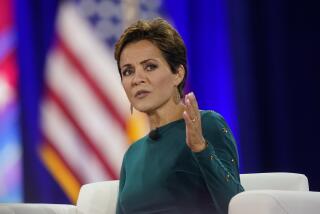John McCain made his mark on TV as a politician who didn’t speak like one
John McCain was a perennial on Jon Stewart’s “The Daily Show.”
And the Arizona senator often bragged that he held the record for the most appearances on “Meet the Press”: McCain guested at least 70 times.
Jay Leno, David Letterman, Jimmy Fallon and Seth Meyers repeatedly joked and sparred with the cantankerous congressman as if he were an old friend or close relative with opposing political views.
And following his death Saturday at age 81, the memory of McCain generated wall-to-wall news coverage. From “Good Morning America” to his familiar “Meet the Press” haunt, networks and cable covered his passing like that of a dignitary or president.
Veteran political reporter and MSNBC anchor Andrea Mitchell choked up when discussing McCain’s legacy and “greater vision of America.” CNN’s Wolf Blitzer was uncharacteristically emotional as he interviewed guest after guest about the outspoken senator who publicly challenged the policies of three presidents and the recent direction of his own party.
Fox News senior political analyst Brit Hume broke from his network’s usual support-Trump-no-matter-what stance in response to a curt tweet from the president offering condolences to the late senator’s family. The brief post was in lieu of an official statement from the White House.
“Still not a kind word about McCain himself,” Hume tweeted.
Donald Trump may be our first TV-bred president, but McCain — whose 30-years-plus U.S. senate run was filled with the dramatic twists and turns of an Emmy-winning drama series — cultivated a magnetic on-screen persona well before “The Apprentice” producer Mark Burnett painted Donald Trump as a competent leader.
Viewers saw McCain as a politician who didn’t speak like a politician. He was a D.C. anomaly who forged lasting relationships with anchors, reporters and Americans of all political persuasions. He was quick to anger, even on camera, dropped four-letter words in public that might have ended the careers of his conservative contemporaries and eviscerated unlucky reporters who dared to ask loaded questions when McCain wasn’t in the mood.
But he always came back to the table to keep the discussion going, and that’s what viewers who fret for our democracy will miss most: a D.C. leader who put conviction above party.
McCain was by no means perfect. He flip-flopped on issues when it suited him, was embroiled in a scandal that he barely survived and made questionable decisions while running for office against Barack Obama in 2008 that he wasn’t proud of (running mate Sarah Palin was one of them).
His life played out on television, from his early introduction to a national audience as a captive POW in the 1970s to his early 1980s Senate win, to newscasts on the Keating Five scandal to his run for the Oval Office to a recent documentary on McCain’s life, HBO’s “For Whom the Bell Tolls.” And when strung all together, these small-screen moments chronicle the life of a public servant who, when swayed, returned to his own moral compass for guidance. Authenticity was his appeal.
He often deviated from talking points beneficial to him or the party in favor of speaking his own truth. One such case has been played across social media and old-timey TV networks since his death: the clip of him at a 2008 town hall meeting correcting a woman who said she couldn’t trust Obama because he was “an Arab.”
“No, ma’am,” interrupted McCain. “He’s a decent family man. [A] citizen that I just happen to have disagreements with on fundamental issues, and that’s what the campaign’s all about. He’s not [an Arab].”
I’m one of many Arab Americans who found his answer problematic – it implied that Arabs aren’t decent people. Still, I admired McCain for putting his own interests aside and challenging the racist rhetoric being used to demean his African American opponent. I suppose it’s one more example of a journalist having issues with McCain while still respecting his fearless candor.
His politics could be polarizing, especially to those outside the Republican party. He was a major proponent of the war in Iraq; it was at the root of one of the more heated exchanges he would have with Stewart over the years.
Despite one’s political leanings, McCain was still a dynamic guest to watch. He’d often admit his mistakes or shortcomings during interviews and that made him the type of flawed character audiences love.
It must be excruciating now for Trump to see so much love and respect for McCain. Not only was the late senator a vocal critic of the president, his popularity across all types of media undermines a mantra that helped get Trump elected and has provided ratings for Fox News year after year: The liberal media is out to get the right and Republicans can’t get a fair shake from the “mainstream” press.
All one had to do was watch MSNBC in the hours and days following his death to see liberal commentator after liberal commentator mourn his passing. Those who knew him, like Chris Matthews, expressed personal grief. Others bemoaned the loss of a politician who put country before party. Will we ever see that again?
Let’s leave the history of who shot first to the historians. I suspect they’ll find we all conspired in our decline.
— John McCain
McCain announced he had cancer a year ago, in July 2017. Even then he wasn’t ready to retreat from cameras, or the Senate floor, where he delivered a speech imploring compromise among his peers.
“Let’s leave the history of who shot first to the historians,” he said. “I suspect they’ll find we all conspired in our decline — either by deliberate actions or neglect. We’ve all played some role in it. Certainly, I have. Sometimes, I’ve let my passion rule my reason. Sometimes, I made it harder to find common ground because of something harsh I said to a colleague. Sometimes, I wanted to win more for the sake of winning than to achieve a contested policy.”
McCain, who was undergoing treatment, hadn’t been in Washington for more than six months before his death. But even in his absence, the 5-foot-8-inch agitator was a formidable presence. His last public statement was one of his most direct.
Last month he called Trump’s summit in Helsinki with Russian President Vladimir Putin “a tragic mistake” and one of “the most disgraceful performances by an American president in memory.”
The White House was one of the few D.C. institutions on Monday that did not fly the flag at half-staff, which is customary to do until the deceased is buried, which in McCain’s case is Sunday. After much criticism, Trump acquiesced, released a statement and ordered that the flag be lowered.
Trump’s petulance made the news as usual, but this time as a footnote. The majority of airtime was dedicated to McCain, whose bipartisan cage-rattling, strong opinions and sharp wit made TV’s political coverage a more colorful affair.
More to Read
The complete guide to home viewing
Get Screen Gab for everything about the TV shows and streaming movies everyone’s talking about.
You may occasionally receive promotional content from the Los Angeles Times.







